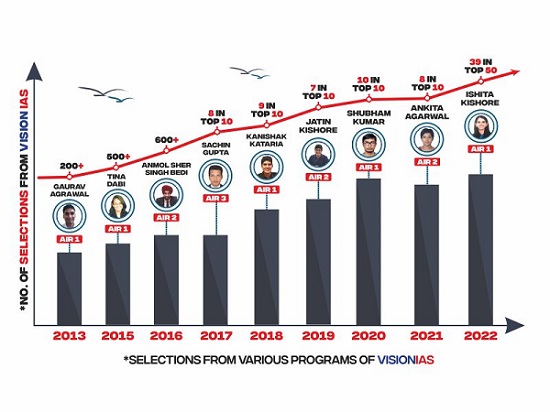As the Civil Services Mains Examination draws closer, aspirants are often engulfed in a whirlwind of emotions, stress, and anticipation. The final week before the exam is undoubtedly a crucial period where every moment counts. In this article, we will outline some crucial guidelines tailored to help UPSC Mains aspirants maximize their performance and emerge victorious in the Mains Examination 2023.
- As aspirants give the final touches to their preparation, what should be the effective syllabus management strategy?
- In this last stretch, aspirants often find it challenging to decide what to read and what to leave out while revising their syllabus. The key to effective syllabus management lies in prioritization. Identify the relative importance of subjects and topics based on previous years’ trends and their own strengths and weaknesses.
- What’s the best way to revise efficiently and effectively in the coming days?
- To address this issue, a strategic and smart revision approach can be employed. The “Five Things” rule can be the guiding principle. For each topic or subject, focus on the following elements:
- Facts: Establish a strong foundation with key facts and data.
- Dimensions: Develop a holistic view by considering different aspects and perspectives.
- Keywords: Understand the critical terms and concepts that should be incorporated into your answers.
- Case Studies: Practice incorporating relevant case studies to support your arguments.
- Examples: Illustrate your points with real-world examples.
This comprehensive approach ensures a deeper understanding and aids in better retention.
- What should be the approach to content enrichment during this time? Would it be counterproductive to read and collect more content?
- Content enrichment entails not accumulating new information at the eleventh hour. Instead, it involves augmenting your comprehension of previously studied material using pertinent data, facts, and examples. In subjects like Ethics and Essays, it’s beneficial to revisit and recollect relevant case studies, examples, quotations, idioms, and phrases.
Furthermore, consider employing flowcharts, diagrams, and graphs in suitable contexts to visually represent intricate concepts, enhancing the effectiveness of your communication.
- Is it advisable to pick up new resources at this juncture of the examination?
- It’s natural to experience doubts and feel the urge to seek more information. However, overloading with new material can lead to confusion and anxiety. Rather, aspirants should stick to the resources they have been using throughout their preparation.
- Should students practice answer writing in the final week before the exam?
- It is important to have a balance between revision and practice. Students should try to maintain the momentum of answer writing during the crucial pre-examination period.
Revisiting and brainstorming past mock test questions is not only an effective revision strategy but also aids in enhanced answer writing during the examination. Additionally, it is advisable, to keep a note of key points/concepts while revising. This will aid retention and also contribute to stress reduction.
Further to develop increased confidence and timely completion of the Papers, aspirants should practice answering 10-mark questions in 7 minutes or less and 15-mark questions in 11 minutes or less.
- A few days before the exam, how can students effectively manage their time?
- Optimize remaining time with a structured and realistic study schedule that optimally allocates time across General Studies, Optional subjects, Essays, language papers, and rest for comprehensive preparation while preventing burnout and mental fatigue.
- How important is the preparation for compulsory language papers?
- Language papers should not be overlooked or underestimated. Aspirants should complete at least one regional language paper and an English paper before the exam. This proactive approach will help them identify and address any potential issues while building confidence and familiarity with the Papers.
- What is the significance of mental and physical health in the context of this Examination?
- Mental and physical health management plays a crucial role in ensuring optimal performance during this exam. Achieving a balance between preparation commitments and health is essential for full potential utilization and score maximization.
- What is the role of quality sleep in this regard and how it can impact an aspirant’s performance?
- Quality sleep, amounting to 7-8 hours each night, is the foundation of mental alertness and performance. Aligning one’s biological clock with the exam schedule is crucial. Further, implementing a digital detox, combined with relaxation techniques and meditation, helps aspirants make the best use of their time and achieve better sleep quality.
- What role do a healthy diet and nutrition play in exam preparation and eventual performance?
- While caffeinated and energy drinks can provide a short-term energy boost, excessive consumption can lead to energy crashes and increased anxiety. Aspirants are advised to moderate their intake of such beverages and rely on a healthy diet rich in essential nutrients. Incorporating fruits and vegetables into meals enhances cognitive function and overall health leading to improved performance.
- How can stress management techniques be helpful during this crucial phase of preparation?
- Stress is an inevitable part of exam preparation. Practices like meditation, yoga, and physical activities, such as a brisk walk or stretching exercises, can alleviate stress, improve blood circulation, and boost overall mood and confidence.
- What is the role of peer support in maintaining a positive outlook toward the examination?
- Peer support is invaluable during the final week of UPSC Mains preparation. Peers, mentors, friends, and family provide not only critical inputs but also encouragement, motivation, and understanding. It’s important to seek support from those who uplift and motivate while avoiding interactions with individuals who may demotivate or increase stress.
- Why staying organized and well-prepared is crucial for success?
- Staying organized is essential to reduce last-minute stress. Aspirants should ensure their study materials, ID cards, and other essentials are ready well in advance. Familiarizing themselves with exam guidelines and center details is equally important to avoid unexpected challenges.
- Any final advice for aspirants as they approach the UPSC Mains Examination?
- Replace negative thoughts with positive affirmations, regularly remind yourself of your achievements and capabilities, and surround yourself with positive influences. A positive mindset is the key to success.
“A problem worth an attack proves its worth by fighting back. “
The UPSC CSE is undeniably one such problem that tests not only the academic skills but also the mental resilience of aspirants. These guidelines are excellent starting points that would help aspirants emerge victorious in their endeavors. However, given the peculiar circumstances of each aspirant, they should look to tailor them to meet their specific needs.
Ultimately, it is the hard work, commitment towards the goal, and conviction in one’s ability that matter in the examination hall.
Visit us at: http://www.visionias.in/delhi/
Or Call us at: 8468022022, 9019066066















![The Association of Indian Technology Sales Professionals™ [AITSP] Welcomes Industry Stalwarts Amit Chatterjee and Somya Shahi to its Advisory Board](https://www.newsfringe.online/storage/2024/09/The-Association-of-Indian-Technology-Sales-Professionals™-AITSP-Welcomes-Industry-Stalwarts-Amit-Chatterjee-and-Somya-Shahi-to-its-Advisory-Board-300x200.png)







